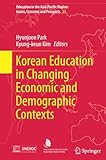Korean Education in Changing Economic and Demographic Contexts / edited by Hyunjoon Park, Kyung-keun Kim.
Material type: TextSeries: Publisher: Singapore : Imprint: Springer, 2014Edition: 1st edDescription: 209 p. : ill. ; 24 cmISBN:
TextSeries: Publisher: Singapore : Imprint: Springer, 2014Edition: 1st edDescription: 209 p. : ill. ; 24 cmISBN: - 9789811013256
- 23 379.5195 K842
| Item type | Current library | Collection | Call number | Vol info | Copy number | Status | Date due | Barcode | Item holds | |
|---|---|---|---|---|---|---|---|---|---|---|
 Books
Books
|
Library, Independent University, Bangladesh (IUB) Window on Korea | Non-fiction | 379.5195 K842 (Browse shelf(Opens below)) | 2014 | 01 | Available | WOK000978 |
This edited volume offers a comprehensive survey of Korean education in transition. Divided into three parts, the book first assesses the current state of Korean education. It examines how the educational system handles the effects of family background and gender in helping students smoothly transition from school to the labor market. Next, the book introduces growing concerns over whether the traditional model of Korean education can adequately meet the demands of the emerging knowledge-based economy. It examines features of new reform measures that have been introduced to help Korean education prepare students for the new economy. The third part discusses how an influx of diverse migrant groups, including marriage migrants, migrant workers, and North Korean migrants, and the rising divorce rate - two major demographic changes -challenge the fundamental assumption of cultural homogeneity that has long been a part of Korean education. This detailed analysis of a society and educational system in transition will appeal to a wide range of readers, from those involved with Korean education to educators and administrators in countries currently looking for ways to handle their own economic and demographic changes.
Description based on publisher-supplied MARC data.
